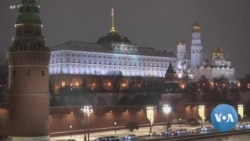The United States and NATO have provided written responses to Moscow, addressing Russia’s renewed security demands, following consultations with various European partners as well as Ukraine — the latest moves in diplomatic maneuvering aimed at heading off armed conflict.
U.S. Ambassador to Russia John Sullivan delivered the document in person Wednesday to Russia’s Foreign Ministry. Separately, NATO transmitted to Russia its own responses regarding European security, described by officials as a few pages in length.
Officials portrayed the responses as a way to address the Kremlin’s concerns while also giving all sides a chance to further pursue diplomacy.
“The document we’ve delivered includes concerns of the United States and our allies and partners about Russia’s actions that undermine security — a principled and pragmatic evaluation of the concerns that Russia has raised, and our own proposals for areas where we may be able to find common ground,” U.S. Secretary of State Antony Blinken told reporters during a press conference.
“We’ve addressed the possibility of reciprocal transparency measures regarding force posture in Ukraine, as well as measures to increase confidence regarding military exercises and maneuvers in Europe,” Blinken said. “We are acting with equal focus and force to bolster Ukraine’s defenses and prepare a swift united response to further Russian aggression.”
Blinken said he expected to speak to Russian Foreign Minister Sergey Lavrov in the coming days after the Russian side had a chance to discuss the U.S. response.
“As I’ve said repeatedly, whether they choose the path of diplomacy and dialogue, whether they decide to renew aggression against Ukraine, we’re prepared either way,” Blinken told reporters.
U.S. officials declined to elaborate on specifics, though they expressed hope Washington and Moscow still could find consensus and even make progress on issues such as arms control related to missiles in Europe.
Moscow’s security demands include a pause of NATO’s eastward expansion, especially in Ukraine and Georgia, as well as a rollback of NATO troops in Eastern Europe.
The United States has dismissed those demands as nonstarters, demanding Russia pull back its forces from the border with Ukraine and instead offering dialogue with Moscow on issues including military exercises and transparency, as well as the placement of missiles.
Russia offered a cautious initial response to the written proposals.
“We will read it. Study it,” Russian Deputy Foreign Minister Alexander Grushko told the Interfax news agency when asked about the NATO document. “The partners studied our project for almost a month and a half.”
In contrast, NATO Secretary-General Jens Stoltenberg told reporters there is a growing sense of urgency, calling on Moscow to “withdraw its forces from Ukraine, Georgia and Moldova, where they are deployed without these countries’ consent.”
“We face a critical moment,” he said, warning that Russia now has positioned more than 100,000 troops along its border with Ukraine, with additional deployments already under way.
“We see also more troops not only in and around Ukraine, but also now in Belarus, where Russia is in the process of deploying thousands of combat troops, hundreds of aircraft, S-400 air defense systems, and a lot of other very advanced capabilities,” Stoltenberg added.
“We have listened to Russian concerns. We have listened also to the Russian call for a written response,” he said. “This is about whether there’s a will to engage in good faith and to try to sit down and find common ground.”
Ukraine Foreign Minister Dmytro Kuleba said Wednesday that Kyiv had no objections to the U.S. responses to Russia, acknowledging the threat from the number of Russian troops massed along his country’s borders as well as in Ukrainian territories occupied by Russian forces.
Still, Kuleba insisted there was no need for panic to take hold.
“At the moment, as we speak, this number is insufficient for the full-scale offensive against Ukraine along the entire Ukrainian border,” he said.
While the United States would not rule out an imminent military move by Russia against Ukraine, a senior State Department official noted that Russian President Vladimir Putin may not want to upset China when the country is hosting the opening ceremony of Winter Olympics.
“We certainly see every indication that (Putin) is going to use military force sometime perhaps now and middle of February,” said Deputy Secretary of State Wendy Sherman on Wednesday during a virtual event with Yalta European Strategy, a European security forum.
“We all are aware that the Beijing Olympics begin on February 4 — the opening ceremony — and Putin is expected to be there,” added Sherman. “I think that probably President Xi Jinping would not be ecstatic if Putin chose that moment to invade Ukraine. So that may affect his timing and his thinking.”
Some analysts agreed with the assessment, noting Russia’s military logistics “have not yet been fully activated to start massive military operations.”
“The Winter Olympics in China, to be held between 4-20 February, might offer some respite,” said Mathieu Boulegue, a research fellow for the Russia and Eurasia program of London-based Chatham House. “To safeguard relations with Beijing, Moscow may avoid repeating its actions of August 2008, when Russia took military action against Georgia, literally during the opening ceremony of the Beijing Summer Olympics.”
In Kyiv, the U.S. Embassy is urging American citizens in the country to consider departing now, citing “unpredictable” security situation that “can deteriorate with little notice.”
Since 2014, the United States has committed more than $5 billion in both security and non-security assistance to Ukraine, including more than $351 million in assistance to those displaced or affected by “Russia’s aggression,” according to Deputy Secretary of State Sherman.
VOA National Security Correspondent Jeff Seldin contributed to this report, which contains some information from the Associated Press, Agence France-Presse and Reuters.







